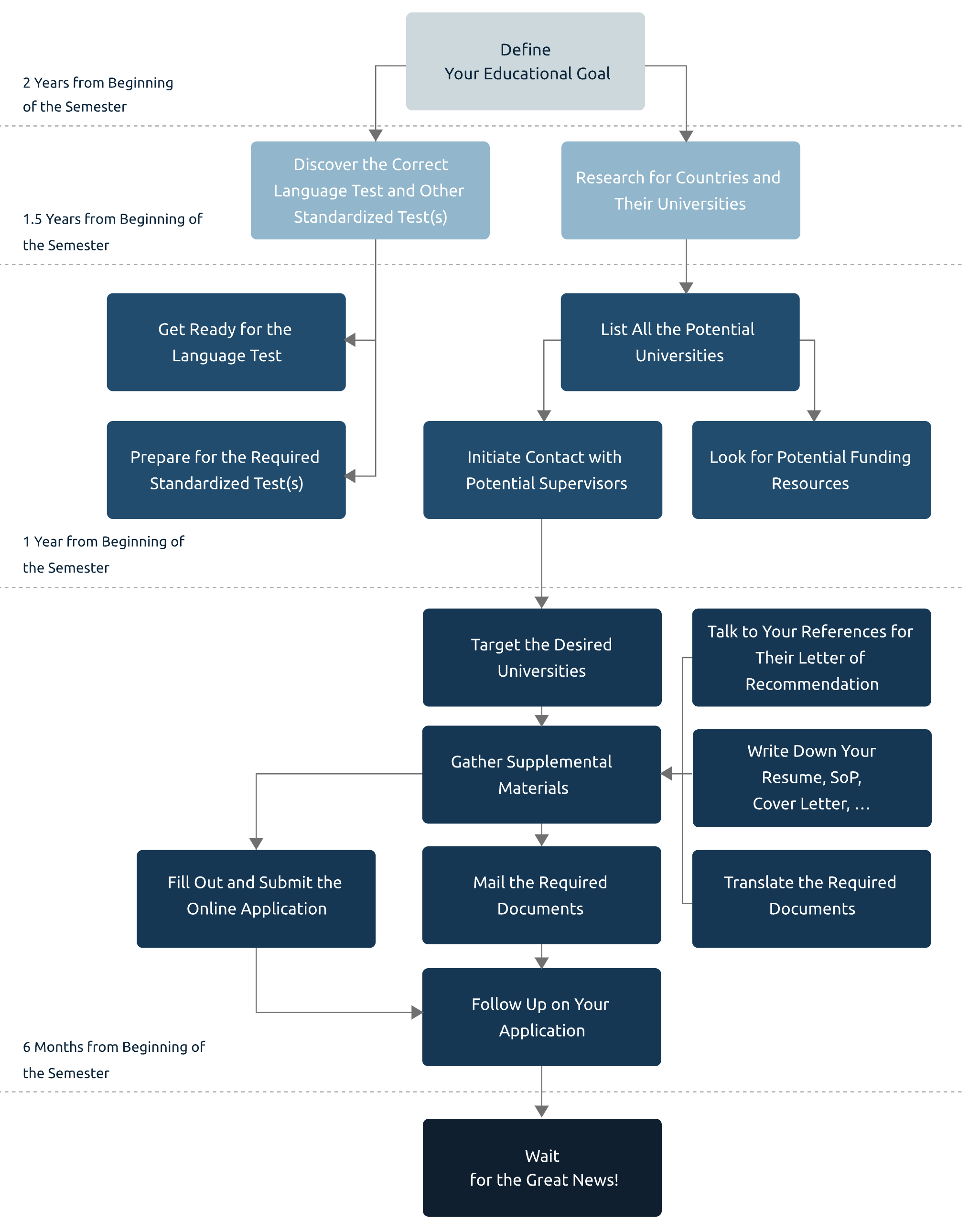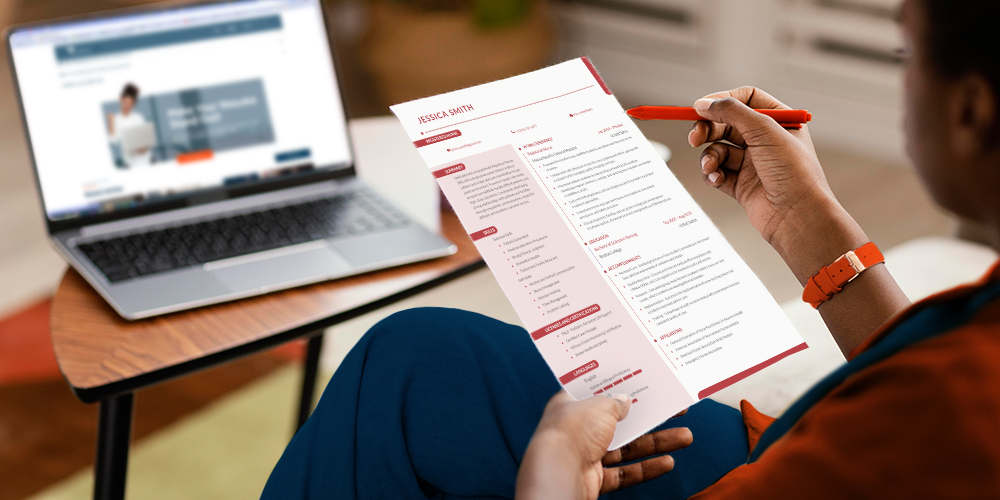
Imagine you have made up your mind to study abroad and become an international student. At this point, you have to do your research and apply for a university. University admissions requirements vary from country to country and from university to university. The sooner you start searching for information and begin the application process for a university program, the higher the chances you will be accepted by one or more universities that you dream about.
Applying to a university, whether in European countries like the UK, France, Germany, or in North America like Canada, or anywhere else, is not as complicated as you might think. You need to pay attention to a few details, prepare all the necessary documents, and take action as soon as possible. Moreover, applying to universities can be daunting, but taking a step-by-step approach and following the process would allow you to succeed. In this article, Radviser summarizes different steps of how to apply to a university.
University Admission Process
First, let us give you a clear road map of what to expect at the beginning of your journey. This chart shows a comprehensive process that takes about 2 years. Please bear in mind that applying to different universities may not need every single step of this chart. For example, there might be some particular cases where the whole process may take less than 6 months. The university you are considering may not need a language test, or you may not feel the need to contact professors or even your contact with a faculty member may be answered quickly, and you will be able to attend the classes within 6 months. However, having a solid plan in advance would help you get rid of unnecessary tension and stress.

How to Apply to Universities Worldwide?
Applying to universities worldwide differs from country to country, and no one can formulate the perfect way of obtaining admission to your desired university. However, there are some general rules and tips that can help you gain admission.
1. Define Your Educational Goal
It is in your best interests to define your educational goals. Without having your goals set, you might end up wasting your time and your money. A person's goal of continuing their education must be clear. A high percentage of students continue their education due to their interest in a particular field and subject, improving their knowledge, and doing research in that field. For this group of students, the existence of the desired field of study in the target university is the first and most important criterion.
Therefore, in the first place, determine what your goal is to study higher education. Do you want to pursue science, then find a career in research, and eventually become a faculty member in a particular field? Are you a professional who wants to gain basic knowledge and then enter into the job market? Does education work like a bridge for you to live and work in another country? Based on these, specify the range of your choices and know what parameters your priorities are.
However, you should keep in mind not to be very strict about your goal! Even if you have set a clear goal to go for a specific program at a certain university, it is always best and wise to consider at least a few universities to apply to, even if they are in different locations or countries. Since you do not know about the future, sometimes there might be some unwanted circumstances to achieve our targets. You should always have this mindset not to be disappointed if you get rejected once, or things do not go exactly as you wish and as you want. Try to see the bigger picture and do not allow any obstacle to stop or discourage you.
2. Discover the Correct Language Test(s) and Other Required Exam(s)
Universities around the world offer courses in English or the official language of their own country. Some universities may not ask you for a language proficiency certificate, and they may offer language preparation courses for students before the main program/degree. However, almost all universities with high credibility put you on the path of learning a specialized language and presenting test results.
Suppose you would like to enroll in an English-speaking academic institution in a place like the United States, Canada, Australia, or the United Kingdom, and you come from a country where English is not their first language. In that case, you may have to prove that you can handle English as the language for the coursework. For different languages like German, Russian, Spanish, French, etc., there are official tests and certificates that a university may request.
While you are studying for your undergraduate degree, you will find out what tests are necessary to continue your studies in your field of study. Getting ready for these tests is one of the substantial steps in the admissions process. You should find out the correct test and gather information on the test resources, test methods, and everything else about two years from the beginning of the semester.
resume_5_light_banner
3. Get Ready for the Language Test
After finding out the correct language test, you will need to prove that you have a high level of required language proficiency by scoring well on the test. You should start getting yourself ready to take the exam about a year before the beginning of the semester. Here is a list of some of these standardized language proficiency tests:
1. English
• TOEFL
TOEFL stands for Test of English as a Foreign Language and is one of the tests you might need to take. The TOEFL tests your reading, listening, speaking, and writing skills in four different sections, each section devoted to one skill.
• IELTS
The International English Language Testing System (IELTS) is also another widely recognized English language proficiency test. It is jointly managed by the British Council, IDP Education, and Cambridge English Language Assessment. IELTS also tests all four English communication skills: reading, listening, writing, and speaking.
2. French
• TCF
When it comes to proving your French abilities, the Test de Connaissance du Français (TCF) is one test you dare not miss. It is administered by Centre International d’études Pédagogiques (CIEP) for the French Ministry of Education. Whether for personal, academic, or professional reasons, the TCF will give you a language assessment that follows the standards outlined in the Common European Framework of Reference for Languages (CEFR).
3. Spanish
• DELE
Diplomas de Español Como Lengua Extranjera (DELE) are tests administered by Instituto Cervantes on behalf of the Spanish Ministry of Education and Science and adhering to the standards set forth by the Common European Framework of Reference for Languages (CEFR).
4. German
• TELC
In partnership with the German federal government, the European Language Certificates (TELC) Deutsch provides a fair evaluation of your German aptitude according to the standards set forth by the Common European Framework of Reference for Languages (CEFR).
4. Prepare for the Required Standardized Test
If your grades are not perfect, you would still have a good chance of acceptance by getting a great score on standardized college/university tests that they asked for. Many universities/disciplines demand that all applicants take one of these standardized tests. Start studying the different tests that the college/university accepts almost a year and a half from the beginning of the semester, and pick the one that plays to your strengths, especially if you are asked to do tests focusing on a few chosen subjects.
5. Research for Countries and Their Universities
One of the important parameters of how to apply to universities worldwide is choosing a university in the destination country. You should research to acquire knowledge about the countries, and then decide which country you would like to pursue your study and education. These are the types of questions you might need to have an answer for them:
- What are the countries that offer quality programs in your field of study?
- What country would be a better place for your post-graduate life if you plan to stay there after graduation?
Moreover, the legal requirements for studying in each country are different. Also, the cost of education and living in different countries are very different, and also different financial assistance might be available in some countries. The quality of education depends on different factors like living conditions in a country, welfare and public security, etc. The conditions for continuing education, work, or residence in each country are different and may have a direct impact on an individual's choices. These choices should be weighed against the criteria of the individual goals.

Students, for instance, can categorize the potential universities based on the living conditions of the countries like the following class:
- American and Canadian universities
- Western European and England universities
- Universities of Australia and New Zealand
- Universities of the Middle East and Eastern Europe
- Asian universities in Malaysia, Singapore, India, Japan, and China
You can also add another category for South America and Africa, but the opportunities for international students in those countries are less compared to the above-mentioned list.
On the other hand, students may categorize countries based on the level of development of the countries and the reputation of universities like the following list:
- United States, Canada, and Europe
- Australia and New Zealand
- Countries of East and Southeast of Asia
- Countries of the Middle East and Eastern Europe
In the above order, these countries are classified based on the reputation of the universities, the level of public welfare, the hope of staying or continuing their education.
cost_3_dark_banner
6. List All the Potential Universities
After you have decided which country you are willing to go to, you should research and prepare a list of the universities you would like to continue your education. Since the requirements for each university may vary from others, check and read the academic requirements carefully to figure out the probability of being accepted by the university. Suppose you do not have a clear idea about the requirements; in this case, you can contact the international student centers, graduate offices, or an adviser from the university. These details will be available on the program's web page; you just have to look them up and check if they are up to date.
When choosing a major and university, consider your long-term plans carefully. If you return to your country after completing your studies, if you intend to continue your studies at higher levels in the same country or another country, or if you intend to enter into the job market anywhere else, consider the conditions after graduation.
Pay attention to the legal requirements of the destination country and become familiar with the restrictions as a person with foreign nationality. Consider job market conditions, country's economy, political relations, social conditions, ease of starting a business, residence, and much more.
7. Initiate Contact with Potential Supervisors
There are lots of candidates who apply for university admissions. To distinguish yourself from them, it is worth contacting faculty members (potential supervisors) in advance. In most cases, contacting professors significantly increases your chances of getting admission and financial aid. Although it is not a requirement for admission, this is strongly recommended in some highly competitive disciplines. If you do not find your potential supervisor in some countries, your chance of getting admission drastically decreases.
To initiate the contact, visit faculty members' websites. You can email them if you are interested in the professor's area of study, research, or work. Chances of being accepted are usually higher when you have experience with projects related to the professor's field of work, and it is not always enough to be interested in their projects. If you have friends at the target university, contact them and ask which one of the professors has funding resources. Even a professor who likes your work but does not have funding cannot support you financially and provide you with a research assistant position. So, if you have any friends at the target university, it is worth contacting them to find out more about faculty members who can financially support you.
8. Look for Potential Funding Resources
Cost of living is something that varies in different cities and countries. Usually, all universities provide information on the cost of living in the city and the university's available financial support on their website. There have been numerous instances where a student's lack of adequate funding has made it difficult to continue their education. Tuition fees also vary in different disciplines and at different universities. These costs are also listed on the website of each university.
Some students can get funding from the target university. If the university does not pay for your expenses, you must have a solid plan for financing your studies. Do not take financial risks while continuing your education, as if you quit your education in the middle of the program, you would lose both your time and the money you previously spent. In many countries, students are also allowed a limited work permit. Make sure to research the financial conditions and the possibility of finding student jobs.
On the other hand, loans and grants may be available for students. These grants may be for a specific field, a particular college, city or country, or a specific group of students. Some of these grants are reimbursable, and some are gratuitous. Some are provided by the university, some by the country's government, and some by charities.
Make sure to look for different types of available grants during the university selection process. Never be optimistic about your financial situation, and do not count on it until you are sure of the source. Note that in a foreign country, away from family and friends, and usually in a second-language environment, it would not be easy to be back at home in a financial emergency, and it might be difficult to get the minimum amount of money in a short period from your home.
9. Target the Desired University (Universities)
After creating a list of all potential universities, contacting the potential supervisors, reviewing university admission requirements, it is time to target universities and discover how to apply to them. A target university is the one where your academic credentials (grades, test scores, etc.) fall well within the university's average range for the most recently accepted class. There are no guarantees, but it is not unreasonable to expect to be accepted to some of your target universities.

10. Gather Supplemental Materials
Here are the steps students usually need to follow to gather supplemental documents:
1. Talk to Your References for Their Letter of Recommendation
One of the supplemental materials requested by some universities, and almost all reputable universities, for master's and doctoral degrees, is the Recommendation Letter. This letter may have a special form from the university, or it may be requested on a letter with the university/company letterhead. These letters usually can come from professors who are familiar with your work. The recommendation from the employer is also acceptable for some disciplines and universities. In general, the recommendation letter assesses your strengths, achievements, and abilities during the previous degree or previous employment.
2. Write Down Your Resume, SoP, and Motivation Letter
One of the most significant steps in the admission process is preparing a strong resume. Here is the step you should present yourself and your abilities for the universities to persuade them you are the best candidate among thousands of them. The resume includes your professional and educational background. Of course, a key parameter is a strong resume in terms of grade point average (GPA), academic record, and research background (having journal/conference papers or attending conferences). Almost all universities require you to write a resume in English.
Some universities will require a motivation letter. Here, you should try to be as honest as possible and share all your experiences connected to the academic requirements and your future study program. Make sure you explain why studying at that university means so much to you and what you can gain and offer while being one of their students.
The cover letter is another document that some universities ask for. A cover letter for universities is almost the same as a motivation letter. So, if you have one of them ready, you do not need to write the other one from scratch.
Some universities ask you to provide them with a Statement of Purpose (SoP). This one is a more detailed letter. In this letter, you will explain the future goals of continuing your education and the circumstances you seek to achieve them. Also, give a brief overview of your background, research, areas of interest in education, and more. The SoP also mentions how past academic experience has led you to make your recent decision.
resume_1_dark_banner
3. Translate the Required Documents
All documents have to be issued or translated into the official language of the respective country and legally authenticated by a competent authority. Make sure you read carefully the documents that are required and prepare them as soon as possible. Doing this early offers you a great advantage. If you send the documents and something went wrong, you will still have enough time to make the necessary changes. Transcripts are one of the most requested supplemental materials by universities. Some universities may also require a certificate of completion of the degree. In many cases, a temporary certificate of completion of education is sufficient for initial admission.
11. Interview for Admission (If Necessary)
A student interview may be required in some cases. Some universities or faculty members are willing to schedule a student admissions interview. Therefore, it is worth preparing yourself in advance for interviews in case it is requested. If your college/university requires or requests an interview as part of your application, do not forget about the thank you note! You should send a thank-you letter a day after your interview, thanking them for their time and any impressions you had from the interview.
12. Fill Out and Submit the Online Application
As part of the admissions process, you will be required to fill out and submit the online university application, which asks for your personal information, your previous educational background, submission of the required document, and regular payment for the application fee.
Pay Attention to Details!
When you apply to more universities simultaneously through various online systems, make sure you follow the exact steps and place the names of the universities in the order of your preferences. If you are not careful, you might miss your favorite study destination, so make sure you pay proper attention during the application process.
13. Mail the Required Documents
Some universities ask for hard copies of documents alongside uploading them online. In this case, students have to send the official sealed documents to the target university. You must put your documents, which are different for each university, in an envelope before the university deadline and mail them to the address posted on the university website. Note which documents you should send to which department of the university. Some documents must be sent to the relevant faculty and some to the graduate section of the university.
It is recommended you make a list or a table of target departments, their addresses, the name of the recipient or department, and the required documents - such as test results - that need to be submitted for each one so as not to miss any deadlines or documents. Note that when searching for universities, you may come across a large number of choices. This table will help you a lot to compare these choices and determine the final universities and avoid forgetting the conditions of each university.
Below is the list of the documents that universities usually ask:
- Official sealed transcript(s).
- Recommendation letters if they are written on paper.
- If a university does not have an online application system, print the required forms, fill them out, and put them inside the envelope.
And here is a list of documents you can add inside the envelope:
- Some students put the documents they have submitted online inside the envelope again to send a hard copy. This is not needed, though.
- You can print your outstanding publications and put them in the envelope (some students only put the abstracts of the papers). Usually, in online applications, there is a section dedicated to this task, but some students have many publications, and there is not enough room to submit them all online.
- A resume, SoP, motivation letter, etc., can also be placed in the envelope.
student_1_light_banner
14. Follow Up on Your Application
After submitting your application, most universities send an email of confirmation within a few days. The most important reason to follow up on your application is to confirm they received everything. Accidents and errors happen after you apply, even when you send it in electronically. Things get lost. Websites experience problems. It is best to double-check with the university that they got everything you sent in. This could include the application, essay, letters of recommendation, and more. You also want to be sure they received your official transcripts, test scores if you took them, and any other documents that you sent a hard copy of them to the university.
In the same vein, this is why it is a good idea to send in your applications well ahead of the deadline. Accidents happen: your internet may go out, the university's submission website may go down. The point is, something might prevent your application from making it in. In addition to reducing stress, it also gives you time to check in to ensure they receive your paperwork. If you are missing parts of your application at the deadline, it can result in a decline.
15. Wait for Great News!
At this stage, you should wait to get back from the universities you have applied to. You MUST bear in mind that even if you have started getting acceptance letters, the process of applying to universities is not over yet. Once you are done deciding which university you would like to attend, you will have to let the university know that you have decided to accept their offer of admission.
Radviser wishes you the best of luck in your endeavors to get university admissions. Now that you know how to apply to universities worldwide, check out Radviser's Library to read more about this topic.













